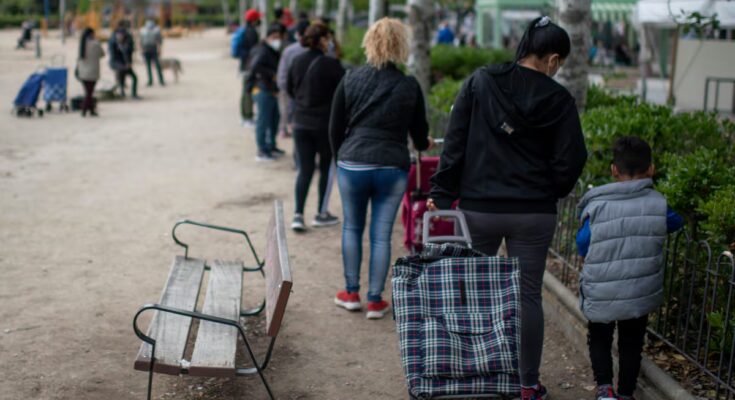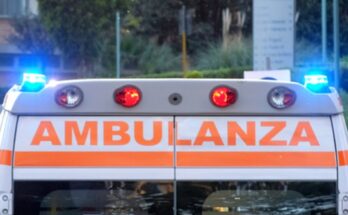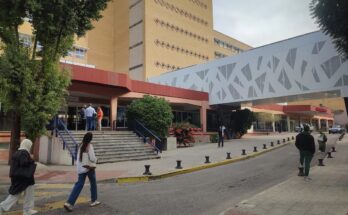Economic growth in the Community of Madrid has not been accompanied by a similar evolution in levels of social exclusion. This is one of the conclusions of the Report on exclusion and social development in the Community of Madrid referring to 2024, prepared by the FOESSA Foundation (Promotion of Social Studies and Applied Sociology), linked to Cáritas Española, presented on Tuesday at the headquarters of the confederation of the Catholic Church in Spain. According to the coordinator of the report, Raúl Flores, the Madrid region is in the middle of the ranking in terms of social exclusion compared to other autonomous communities. However, it “stands out negatively” in the central issue when assessing poverty and exclusion: housing. It also has some of the worst records “when it comes to health and healthcare.”
“Housing today is a problem of exclusion and inequality that affects 23% of the population of Madrid,” Flores said during his appearance. The study presented by FOESSA, in which 180 researchers from 51 universities participated, explains that there is a “growing part” of the population that cannot access home ownership. These people are forced to turn to the rental market where prices have increased “by 24% compared to 2018”. Flores highlighted that in the Community of Madrid there are 400,000 people in “unsafe housing” and another 700,000 who find themselves in overcrowded or unsanitary conditions in their homes: shared apartments where tenants pile up in rooms and even in common areas. This housing problem especially affects young people, the migrant population and single-parent families. According to FOESSA, “more than half of renting families allocate more than 30% of their monthly budget to housing costs”, while one in six, once basic expenses have been paid, falls below the poverty line.
Stephani, a young woman of 30 years of Peruvian origin, is one of the numerous foreign families who reside in Madrid in a situation of social inclusion and overcrowding. She landed in Spain last February with her husband and two children, aged 10 and 6. A few months after settling down, she became pregnant with twins, who are currently five months old.
The arrival was not easy. The couple encountered considerable difficulties in validating their qualifications, a process which entailed a financial cost that they could not bear at the time. This barrier slowed down their access to the job market and further complicated their adaptation to the country. Added to this was the complexity of finding a room in Madrid where children were accepted; and, once the goal was reached, the price doubled the value of that same room if occupied by just one person.
Before the birth of the twins, the family paid 650 euros for a room of a few square meters in the Ciudad Lineal neighborhood. After the birth, and by now there were six members, the price rose to 750 euros for a single room. Despite the difficulties, Stephani maintains an optimistic outlook: “There are always opportunities and good people willing to help,” he says. In the first months they even thought about returning to Peru, especially after the birth of the twins. Living in Madrid on one salary and feeding six people is not easy, but the family has started to see progress and is now waiting for their qualifications to be approved so that they can both access decent work. At the moment, her husband works in an advertising agency while they continue to struggle to consolidate their life in Spain.
“It’s not the people who fail, but the system”
“We are experiencing a process of social fragmentation, with the reduction of the middle class and the movement of many families towards the lower strata,” said Flores. What is failing “is not the people but the system,” he added. Although the level of social exclusion in Madrid has been reduced by 2.5 points compared to 2021, pre-pandemic levels have not been recovered. In total, 19.6% of Madrid’s population (1.3 million people) faces some degree of social exclusion. In 2024, 230,000 more people were registered in this situation compared to 2018. Although the economy grew in Madrid, where the largest increases were recorded in terms of “employed” – 15% – and where unemployment fell to 9%, “the same goes for inequality”. The stagnation of wages in real terms, the price of housing and the precariousness of work mean that work “no longer guarantees social inclusion”. In fact, 11% of Madrid families are affected by problems of work exclusion, such as serious instability, involuntary partiality or unemployment. On the other hand, “the income guarantee system is not up to the needs”. According to FOESSA, the minimum living income (IMV) reaches only 42% of people in severe poverty in Madrid.
Another point in which the Community lags behind other regions of Spain is that of healthcare. Therefore, the study data reflects significant inequality in some areas. For example, 6% of the population cannot afford psychological therapy, while one in five residents in Madrid cannot afford dental care. Similarly, 13% of the population has difficulty affording the cost of medicines or treatments. What is striking in Madrid is that since 2018 the percentage of people combining private insurance with public healthcare has gone from 2% to 15%.
In his presentation, Flores wanted to demonstrate that “the myth of the passivity of people in situations of poverty and social exclusion is false. This is demonstrated by the support provided by Cáritas and the scientific evidence of the report. Most of these people work or look for work, study, train, activate networks, but continually come up against structural barriers”, describes Flores. And it offers one final piece of information: “three out of four seriously excluded families have inclusion plans, but are faced with fragmented arrangements, with very scarce and poorly personalized resources.”



